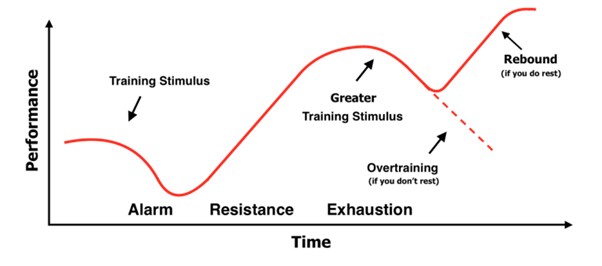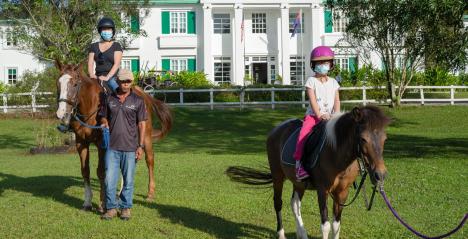It is normal to feel tired after a tough workout. During a training program you are expected to feel some fatigue as you push your physical limits. Training involves getting physical exercise, followed by rest. Rest allows you to recover, get stronger and for fitness adaptations to occur.
However excessive fatigue (or certain signs below) can indicate that you are overtraining. If you do not rest enough, then your body cannot recover, and your athletic performance will decline. The chart below describes the effect of stress (or exercise) on the body, which adapts over time to a greater training stimulus. Failure to rest will result in a decline in performance.

General Adaptation Syndrome Graph (after Hans Selye)
- Alarm: the first response to physical stress from exercise
- Resistance: or the adaptation phase, recovery is important here for our bodies to get stronger.
- Exhaustion: this occurs with lack of rest and recovery and is known as overtraining. This can lead to increased risk of injury, fatigue and overall decreased performance.
When do you know you have overtrained?
I know when some of my patients have overtrained when they say things like “I do 10 HIIT classes a week back to back”, or “I’ve run 10km every single day without a break for the last month”. Typically these patients will come in with pain, usually in their knees, due to repetitive overuse injury.
For those athletes who fortunately haven’t injured themselves (yet) then they may show a collection of signs which indicate overtraining. This may lead them to feel ‘burned out’ and exhausted even after recovery periods.
The most common symptom is feeling tired or ‘fatigue’. Other symptoms include the following, and athletes may present with one, some or rarely all signs.
Signs of Overtraining
- Changed sleep patterns
- Moodiness
- Excessive muscle soreness
- Mental focus decreases & loss of motivation
- Altered appetite
- Frequent injury or illness
- Lack of physical energy (fatigue)
- Abnormal heart rate
How To Overcome Overtraining?
Rest! Think about why you are exercising, what your goals are and get professional help to set and achieve those goals.
- See a medical professional if you have a pre-existing medical condition or develop an injury
- Set goals
- Develop a sound training program that works for you
- Get a coach
- Follow your plan not your training or exercise partners
- Eat properly
- Sleep well
- Deal with non training stress (work, family, etc.)
- Stretch after exercise, ice your sore areas, have a massage
- Rest. Take two days off each week
- Crosstrain (example) alternate between running, swimming, cycling and gym work
- Change your exercise routine every 6-8 weeks
Most of us have busy lifestyles and do not have the discipline to follow a strict training plan by ourselves. I have found working with coaches or exercising in a group much easier than doing it alone. There are a large number of professional coaches for every sport that can be found online or by word of mouth. From my personal experience I have worked with and recommend:
Strength and Conditioning
- Leigh Withers (UFIT) @withers.leigh
- Ron Ng MMA & Fitness (Stronghold MMA) @unkkle_ron
- Aqil Zainal (Evolve MMA) @coach.aqil
Running
- Raviin Kumar @runlikerav
- Natalie Dau @rockstararms
Cycling
- Arthur Tong @elevateperfomancecoaching
- Michael Lyons @coachmikeonthemic
Nutrition
- James Yeo @sportsnutritionistjames
- Aptima Nutrition (Camden Medical Centre)
I thoroughly recommend Brazilian Jiu Jitsu @evolvemma as an amazing physical and mental workout as well! If you are injured then don’t exercise through the pain, I suggest you see an Orthopaedic specialist for advice and treatment.
Dr Alan Cheung @dralancheung
Director of the International Orthopaedic Clinic. Consultant Orthopaedic Surgeon specialising in Sports Injuries and Robotic Joint Replacement
International Orthopaedic Clinic
a. 38 Irrawaddy Road, 05-24 Mount Elizabeth Novena Hospital, Singapore 329563












